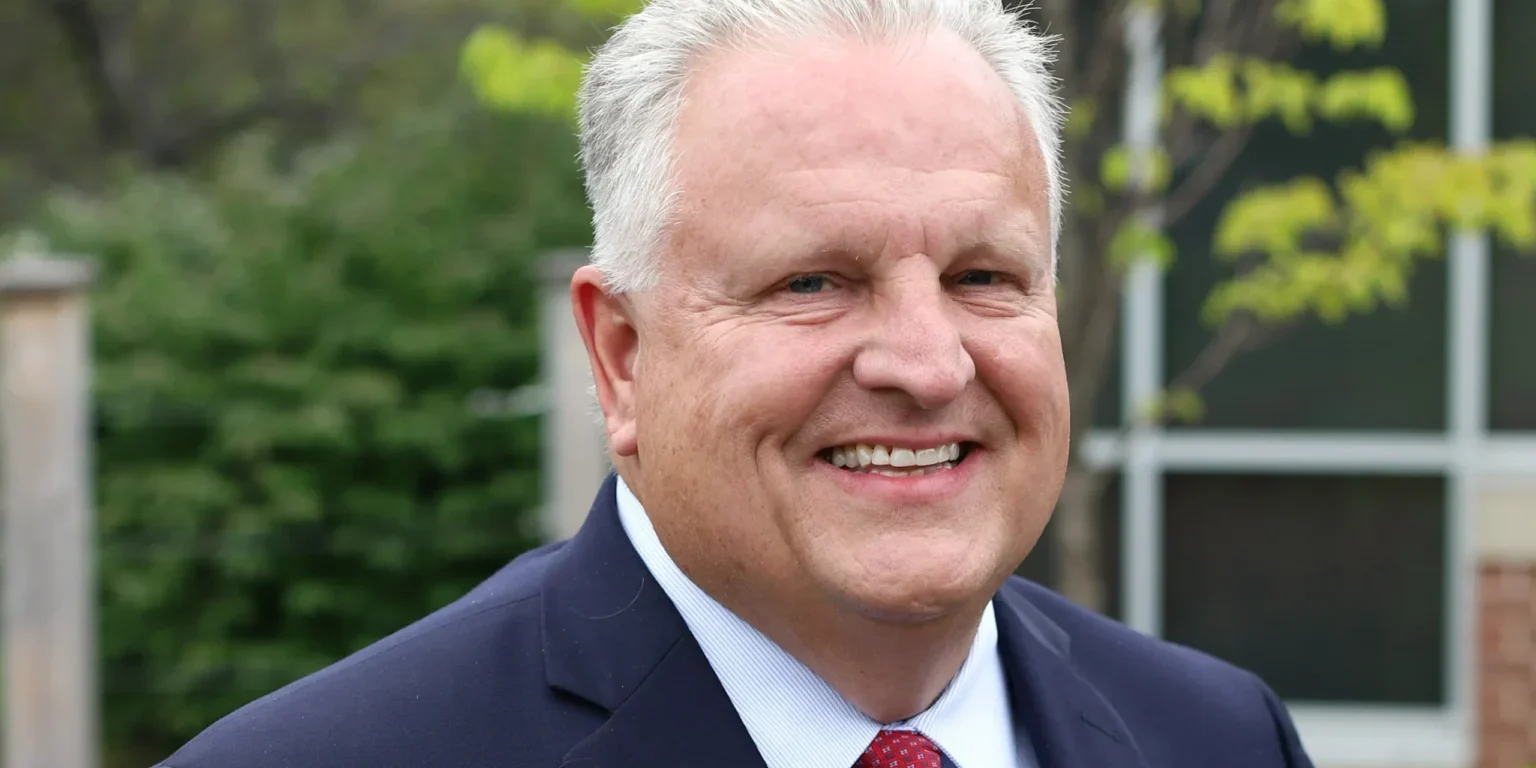
A Career in Law Enforcement With Former Police Chief Kevin Belk
July 1, 2022
Since the founding of DK Security, law enforcement leadership perspectives have been central to the reputation and expertise we’ve built in the security industry. In 2016, Kevin Belk joined DK Security as Senior Vice President, bringing with him 34 years of law enforcement experience which culminated with seven years as chief of police for the Grand Rapids Police Department.
In this Employee Spotlight, Kevin discusses his resume, from a childhood dream of policing to his rise through the GRPD ranks and applying three decades of experience in the private sector.
Early Life and Education
Kevin Belk grew up in the Black Hills neighborhood of southwest Grand Rapids. While attending Grand Rapids Central High School, he nurtured an interest in law enforcement by joining a “student observer” program. 2-3 days a week, Belk spent the afternoon with the Grand Rapids Police Department in ways the name suggests: to observe and learn.
“I always wanted to be a police officer since I was a little kid,” Belk recalls. He remembers looking up to police as a child and a dream took hold. While most kids’ dreams change frequently, his never left.
After high school, Belk enrolled in Grand Rapids Community College (then Junior College), received his associates degree with criminal justice coursework, and attended the Grand Valley State University Police Academy during the summer of 1979.
His early graduation at 20 years old put him at a slight disadvantage in that he wasn’t yet eligible to take the civil service exam or apply for police jobs in many jurisdictions. As he waited for his 21st birthday to come around, Belk worked in a grocery, learned to cut meat, and continued applying for jobs.
Offers from Kalamazoo, Charlotte, Mackinac Island, and more started to roll in on his birthday. During a short stint with the Kalamazoo airport, he continued pursuing his primary goal of working in Grand Rapids law enforcement.
Law Enforcement Experience
Rising through the ranks of the Grand Rapids Police Department
Police Officer | 1980 – 1988
In May 1980, Belk was hired into the Grand Rapids Police Department as a patrol officer. A couple of years later he joined the burglary team. For several years, he supported an investigative unit recently created in response to out-of-control burglary numbers in the city. He later joined the Major Case Team investigating robberies and homicides.
Admittedly, this is the highest that Belk had dreamed for his career until that point. That would change when he was presented with the sergeant’s exam, though. Honored at the chance at promotion, he passed the test at #2 on the list of examinees and stepped into his first supervisory role.
Police Sergeant | 1988 – 1993
A sergeant is a team leader – Belk’s team was on 2nd shift, assigned to the southeast quadrant of the city overseeing patrol operations. He later returned to the Detective Unit and oversaw cases related to theft, supervised detectives from three departments, and enjoyed managing an auto theft team.
Police Lieutenant | 1993 – 1996
When a promotional opportunity opened, Belk passed the lieutenant’s exam and began investigating juvenile crimes at a higher level. This division was reorganized to create a family services team, which brought together multiple squads of investigators for domestic issues and juvenile support in one place.
Commander of the Investigative Division | 1996 – 2003
In success as a lieutenant, Belk’s next jump was to deputy commander of the GRPD detective unit, which included oversight of major cases, burglaries, family services, and case management coordination. Filling a vacancy left by supervisor reorganizations, he was also promoted to acting captain for a few years around this time.
FBI National Academy
193rd Session | 1998
In 1998, then-Police Chief William Hegarty retired from the force, causing a moratorium on new promotions until the arrival of a new chief. Before leaving, though, he recommended Belk for a three-month program at the FBI National Academy.
Young for an acting captain, Belk saw Hegarty’s recommendation as a reward for past work as well as a prospect for professional development. By the time he returned, Belk had developed a desire to become deputy chief of police. Needing a bachelor’s degree, he returned to GVSU for night classes and graduated with a B.S. in Criminal Justice in 2000.
Police Chief Appointment for the Grand Rapids Police Department
Commander of the Support Services Division | 2003 – 2007
Belk never became deputy chief, but an opening in the staff services division presented him with the opportunity to expand his skill set and take another step in career advancement. In somewhat of a “business manager” role for GRPD, he took charge of the department’s support functions: Budget, training bureau, records unit, financial services, and more.
“Not an exciting job,” Belk laughs about administration in comparison to spearheading major case work. Despite this, he values the time he had with the city manager, city commission, presenting budgets with the chief to fiscal committees, and gaining exposure to many high-ranking officials.
Ultimately, Belk credits his time in support services for his eventual rise to the summit of the Grand Rapids Police Department.
Police Chief | 2007 – 2014
In August 2007, Belk was selected by City Manager Kurt Kimball to succeed Harry Dolan as acting police chief for the City of Grand Rapids. The most well-known captain and internal candidate at the time, Belk had extensive case experience, community contacts, and previously worked with Kimball as Commander of the Support Services Division.
By 2008, he had secured the full role of chief and served GRPD until 2014.
Belk’s seven years at the helm were headlined by a 38% reduction in Grand Rapids crime. Using a data-driven policing model, his focuses on crime spikes and allocating resources accordingly were primarily responsible for the department’s ability to achieve that number.
Those years were no walk in the park, though. Budget issues related to the Great Recession necessitated difficult layoff decisions, but Chief Belk was determined to look for creative ways to keep officers on the force. The creation of desk officer positions, for example, allowed police to remain employed, albeit at reduced pay rates.
While not an ideal situation, these altered roles reduced the number of layoffs and kept officers employed. They also retained their seniority and even held onto accrued vacation time.
Belk enjoyed being an active community member as police chief, often attending neighborhood meetings and working with local leaders to directly address the crime in their areas. Furthermore, he felt it was important to increase the amount of time individual police officers spent in specific neighborhoods, encouraging law enforcement based around relationships.
Describing his leadership style as “leading by example” and “making the call you know is right even when it’s difficult,” Belk additionally recommends holding others accountable and displaying integrity in everything you do.
The media played a large part in holding Chief Belk accountable for those calls and even giving him a larger voice. While the pressure of crime and public perception were always present, he lauds the media as having been his main form of communication with the public.
Because he couldn’t be at every neighborhood meeting or community event, Chief Belk acknowledges the voice that reporters and news outlets gave him as GRPD figurehead and tone-setter for breaking news . “The media is what holds people accountable, and you do need that,” he says. “That’s how we communicate to the public.”
“Be focused on the task at hand and always do the best job you can,” Belk advises young professionals. He admits that there was never a time when he looked beyond the next rank, but with experience came confidence and opportunity. In becoming police chief, he had competed with the best, achieved more than most law enforcement officials can ever expect to, and loved the job.
After 34 years with the department, Belk retired from GRPD in 2014. At the time of his retirement, Mayor George Heartwell said Chief Belk was “leaving Grand Rapids a safer place.”
A Second Career With DK Security
Senior Vice President | 2016 – Present
Before leaving GRPD, Belk connected with DK Security co-founder and CEO John Kendall at various committee meetings about joining the private security sector. After two years reviewing inmate cases for the Michigan Parole Board directly following retirement, the conversation began again:
When are you ever going to come work for me?
When are you going to make me an offer?
I made you an offer!
You never made me an offer!
Just after Labor Day in 2016, Belk joined DK Security as Senior Vice President.
Kendall, a retired U.S. Marshal, felt it was important to always have law enforcement leadership within the company, which was founded by law enforcement officials and has always assigned importance to those credentials. Stepping away from day-to-day oversight in late 2016, Kendall left a strong executive team in place and believed in the insight Belk could add as a career law enforcer.
“Frankly, I saw myself retiring as a patrol officer,” Belk reminisces. Throughout his career, though, a commitment to leading by example earned the respect of his peers and consistently put him in a position to succeed. He worked hard, took up the promotion opportunities presented to him, and became a real asset to the Grand Rapids Police Department over 34 years.
These days, Belk reports directly to CEO Sindia Narber and respects the executive relationship he has with her. “If you can’t follow, you can’t lead,” he says.
